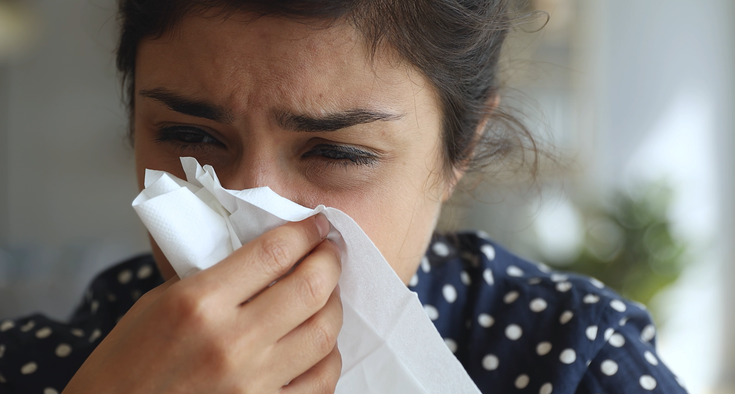The pleasures of mild fall weather come at a cost: itchy eyes, runny noses, nasal congestion, sneezing and other varieties of respiratory misery. Seasonal allergy symptoms can extend well into November in warmer regions.
Around 80 million people in the U.S. suffer from seasonal allergies, the Asthma and Allergy Foundation of America reports.
Good health starts with a visit to your health care clinician. See an expert.

When symptoms strike, many of us go straight to over-the-counter allergy medications. But complementary medicine offers a more natural approach that can sometimes provide relief on par with pharmaceuticals, said Dr. Rachel Baldwin, an integrative medicine specialist at Novant Health Cancer Institute - Kimel Park.
When it comes to natural remedies for seasonal allergies, however, there’s no one-size fits-all approach.
“Every individual everyone responds differently to different interventions, so I suggest that people experiment and find what tends to work best for them,” she said. “It’s good to conduct little ‘trials’ with ourselves. If one particular treatment doesn't work, another one may.”
To that end, she offered a variety of options to try — after checking with your health care clinician, of course — to rule out any potential problems with side effects or drug interactions.
Three natural supplements for seasonal allergies
Stinging nettle (Urtica dioica)
Baldwin’s first choice for a natural allergy supplement, stinging nettle is a natural antihistamine that can be taken on an as-needed basis. In fact, many people find they only need to take it for a few days here and there.
In one study, 48% of participants who took capsules containing 300 mg of Urtica dioica (a preparation of freeze-dried stinging nettle leaves) rated it equally or more effective than medications they previously used to treat allergy symptoms.
Note: It is important to look for supplements labeled “freeze-dried stinging nettle” — other formulations are used to treat benign prostatic hyperplasia (BPH), Baldwin said.
Best doctors. Amazing nurses. Remarkable care.
“In one study, some people found butterbur supplements as effective as Zyrtec,” Baldwin said.
She noted one significant caveat, however: In its raw state, butterbur contains pyrrolizidine alkaloids (or PA), which may cause cancer or liver damage.
So, when shopping for butterbur supplements, it is important to only purchase those labeled “PA free.” She recommends Petadolex.
Curcumin
Quercetin
“This plant chemical helps stabilize mast cells that release substances including histamine that contribute to inflammation and allergic reactions,” Baldwin said. “But, unlike stinging nettle, quercetin helps prevent the onset of allergy symptoms, so you can take it daily as a preventive.”
Found naturally in foods like unpeeled apples, berries, red grapes, black tea and red onions, quercetin is also widely available in supplement form. Because our bodies don’t easily absorb it on its own, most quercetin supplements include vitamin C or bromelain — a protein-digesting enzyme found in pineapple — to enhance effectiveness.
There when you need it: Over-the-counter allergy relief
When seasonal allergies intensify, people with conditions like angioedema, allergy-associated anaphylaxis or asthma may want to visit their health care clinician. For the rest of us, Baldwin recommends trying over-the-counter treatments first.
“Trying natural and drug-store options at home before reaching out to a doctor actually allows for treatment to be more tailored,” she said. “Because when you come in, we’ll already have a sense of what does and doesn’t work.”
Over-the-counter treatments include nasal steroid sprays and less-sedating “second generation” antihistamines like loratadine (Claritin), fexofenadine (Allegra), and cetirizine (Zyrtec). Because studies have linked the more-sedating “first generation” antihistamines, including diphenhydramine (Benadryl), with poor school performance in children, increased risk of accidents and interference with rapid-eye-movement sleep, these options have fallen out of favor.











